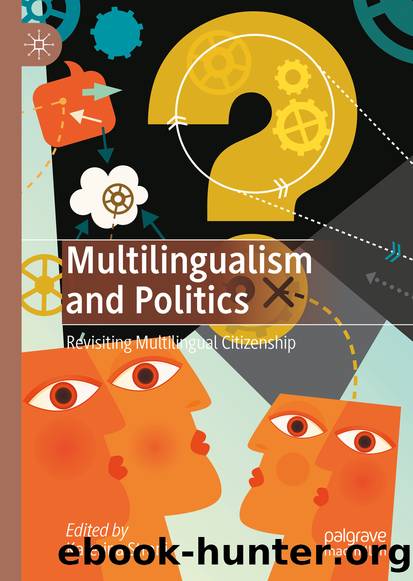Multilingualism and Politics by Unknown

Author:Unknown
Language: eng
Format: epub
ISBN: 9783030407018
Publisher: Springer International Publishing
7.4 Conclusion
Though language policy in Scotland seeks to encourage and support multilingual citizenship, Somali-Scots’ lived experiences suggest that there is considerable work to be done in balancing the weight of English language norms in Scotland’s public sphere. Somali-Scots remain multilingual citizens of Scotland; however, the prioritisation and resourcing of English acquisition does little to formally support this. Meanwhile, Somali-Scots’ language experiences highlight the double-bind to which Black and ethnic minority, multilingual populations in Scotland are subject. Where language norms demand of speakers of ‘community’ languages that they do additional labour to accommodate their multilingualism in the public sphere, racialised language norms seek to build barriers to prevent any access at all.
Research on political and social dynamics in Scotland has traced how racism plays an active part in creating barriers for Black, Asian and ethnic minority people to the public sphere. However, there is still little that considers the interaction between racism and multilingualism, or the role that whiteness plays in establishing certain language norms. This chapter has sought to begin a conversation on these topics, and highlights the need for further work on the relationship between multilingualism, multiculturalism, citizenship and racialised norms in the public sphere.
References
Ahmed, S. (2007). A Phenomenology of Whiteness. Feminist Theory, 8(2), 149–168.Crossref
Download
This site does not store any files on its server. We only index and link to content provided by other sites. Please contact the content providers to delete copyright contents if any and email us, we'll remove relevant links or contents immediately.
| Africa | Americas |
| Arctic & Antarctica | Asia |
| Australia & Oceania | Europe |
| Middle East | Russia |
| United States | World |
| Ancient Civilizations | Military |
| Historical Study & Educational Resources |
The Dawn of Everything by David Graeber & David Wengrow(1707)
The Bomber Mafia by Malcolm Gladwell(1622)
Facing the Mountain by Daniel James Brown(1553)
Submerged Prehistory by Benjamin Jonathan; & Clive Bonsall & Catriona Pickard & Anders Fischer(1455)
Wandering in Strange Lands by Morgan Jerkins(1426)
Tip Top by Bill James(1414)
Driving While Brown: Sheriff Joe Arpaio Versus the Latino Resistance by Terry Greene Sterling & Jude Joffe-Block(1375)
Red Roulette : An Insider's Story of Wealth, Power, Corruption, and Vengeance in Today's China (9781982156176) by Shum Desmond(1359)
Evil Geniuses: The Unmaking of America: A Recent History by Kurt Andersen(1352)
The Way of Fire and Ice: The Living Tradition of Norse Paganism by Ryan Smith(1336)
American Kompromat by Craig Unger(1315)
F*cking History by The Captain(1302)
It Was All a Lie by Stuart Stevens;(1300)
American Dreams by Unknown(1285)
Treasure Islands: Tax Havens and the Men who Stole the World by Nicholas Shaxson(1272)
Evil Geniuses by Kurt Andersen(1257)
White House Inc. by Dan Alexander(1211)
The First Conspiracy by Brad Meltzer & Josh Mensch(1173)
The Fifteen Biggest Lies about the Economy: And Everything Else the Right Doesn't Want You to Know about Taxes, Jobs, and Corporate America by Joshua Holland(1125)
